Unit4 I like music that I can dance to Section B 1a-2e课件(共46张PPT)
文档属性
| 名称 | Unit4 I like music that I can dance to Section B 1a-2e课件(共46张PPT) |
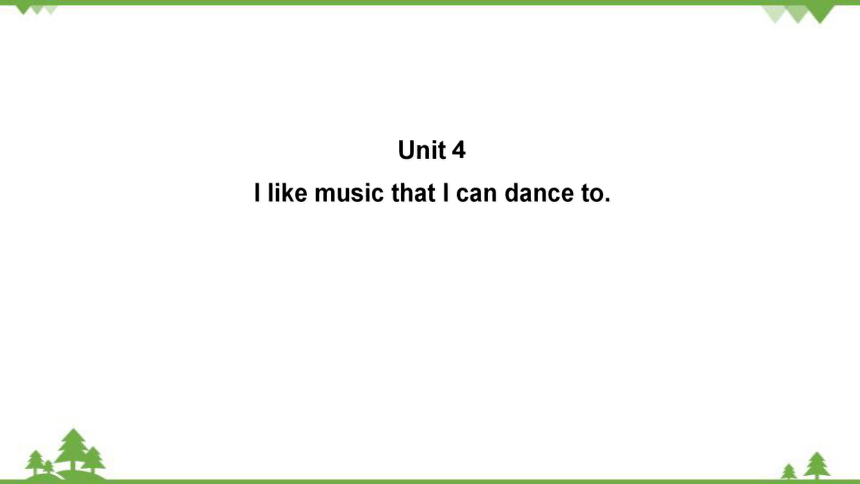
|
|
| 格式 | ppt | ||
| 文件大小 | 2.6MB | ||
| 资源类型 | 教案 | ||
| 版本资源 | 鲁教版 | ||
| 科目 | 英语 | ||
| 更新时间 | 2022-11-15 10:34:52 | ||
图片预览

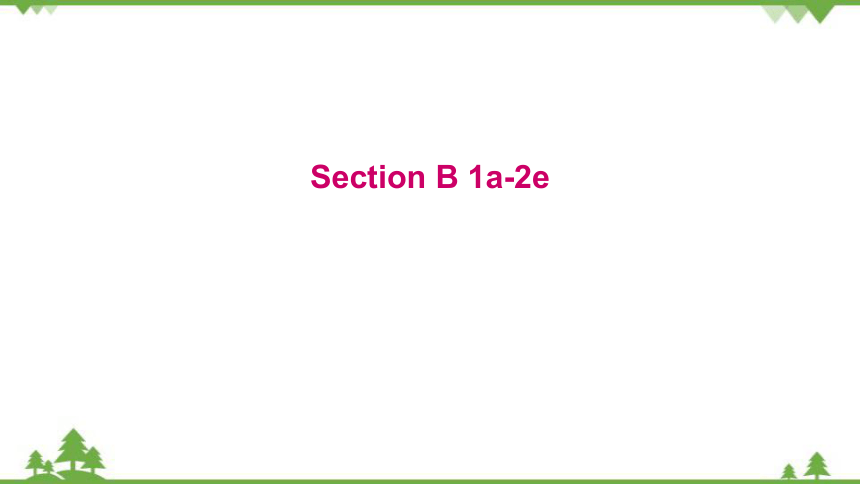
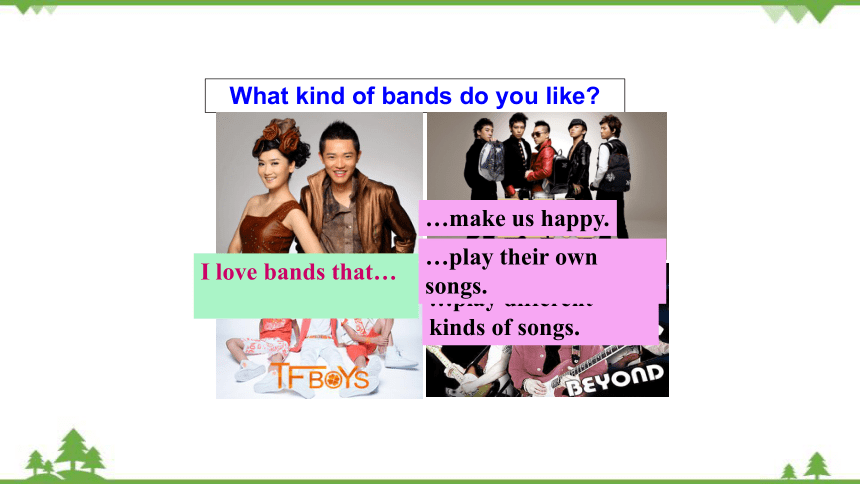
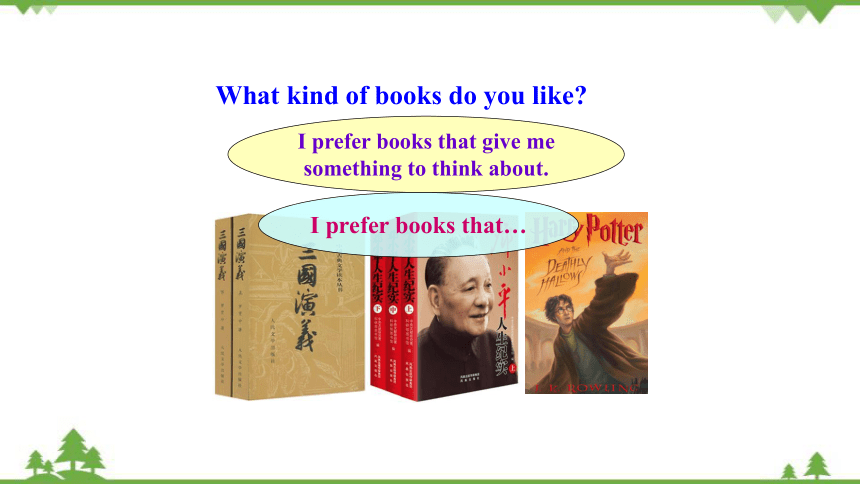
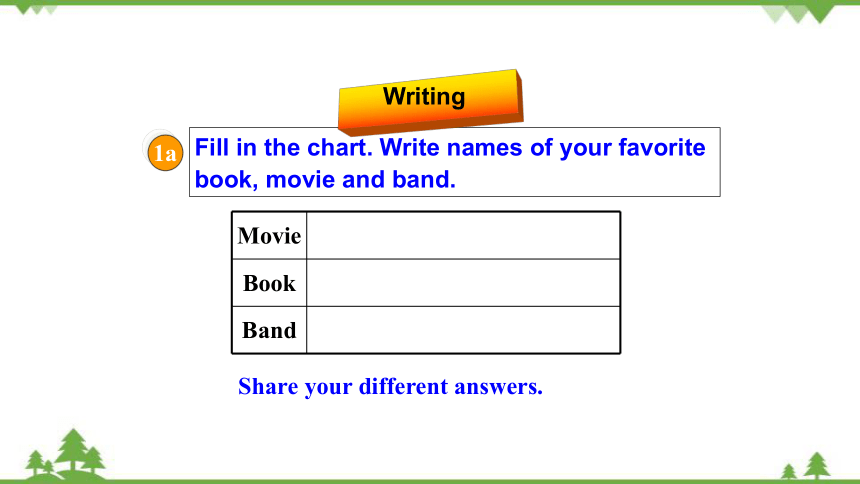
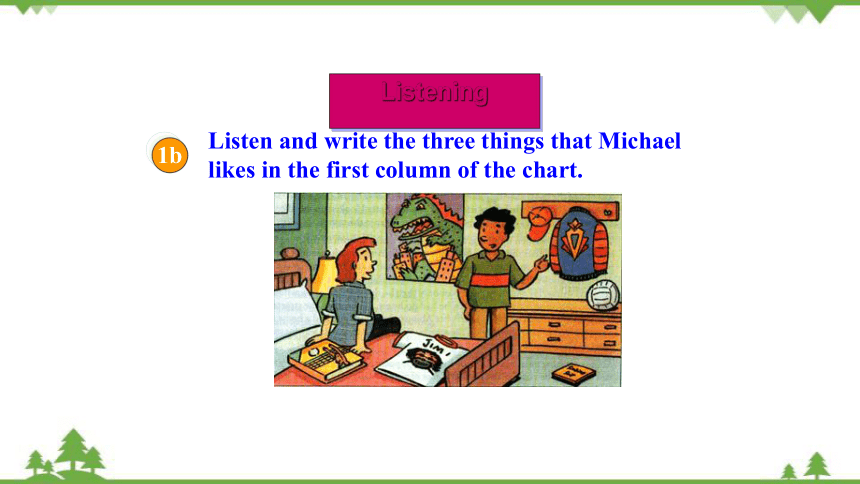
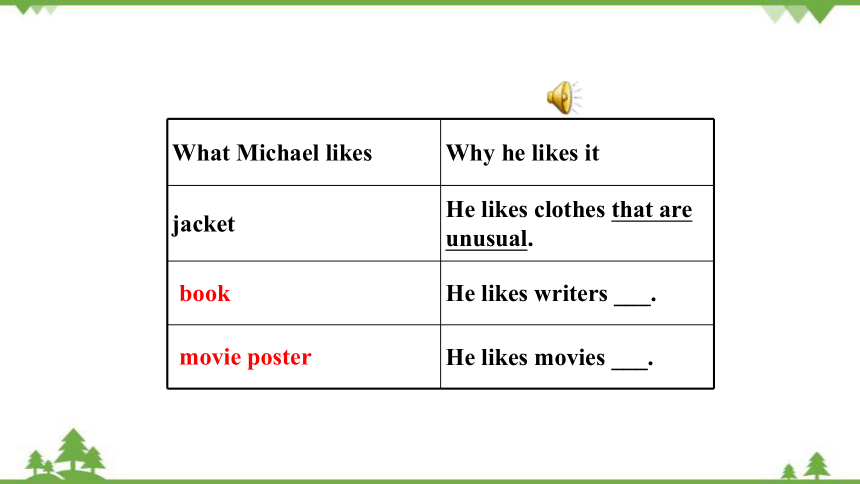
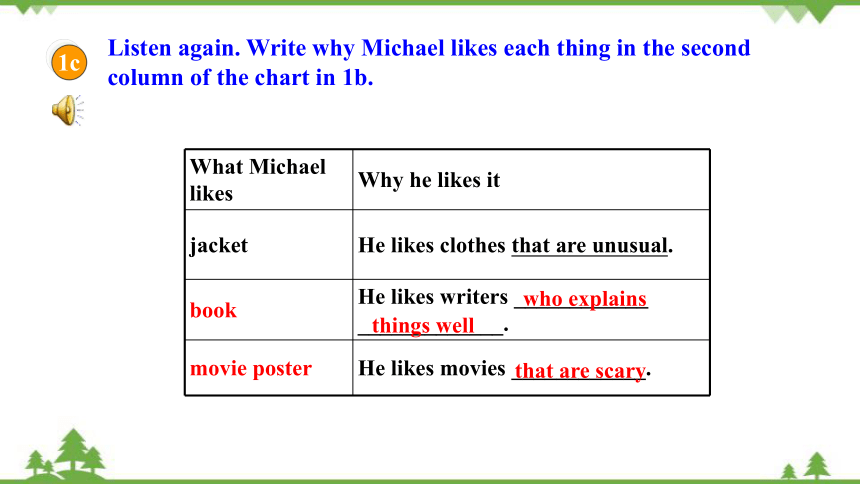
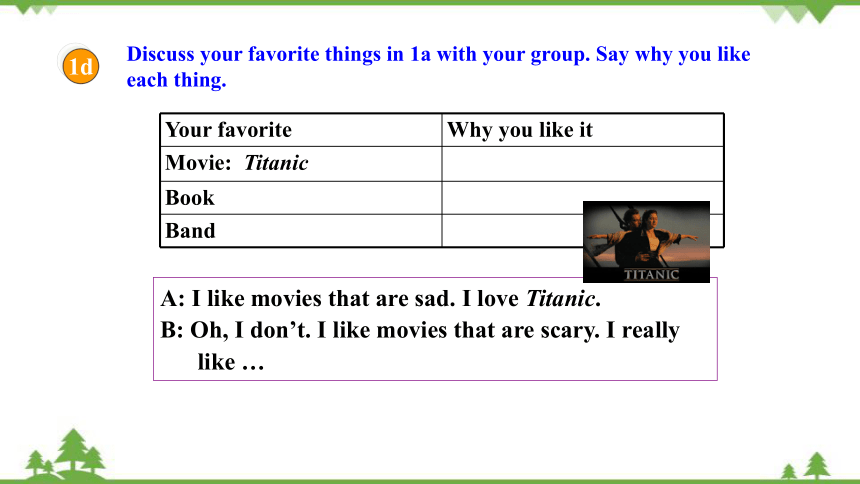
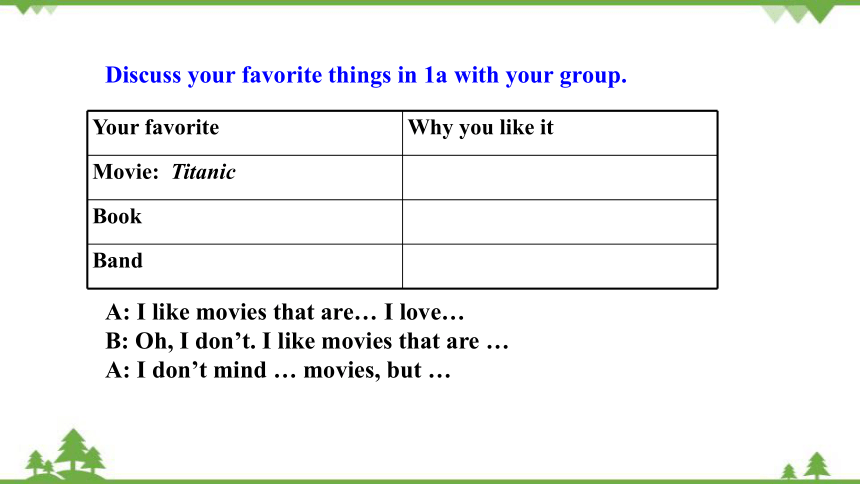
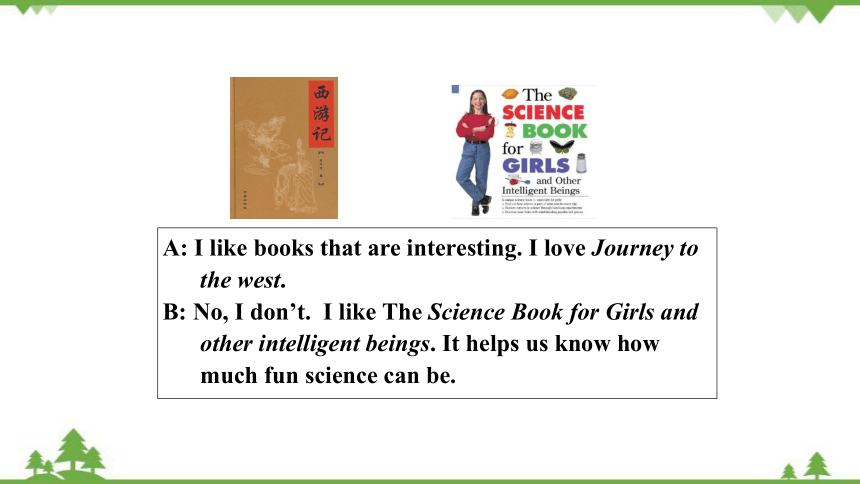
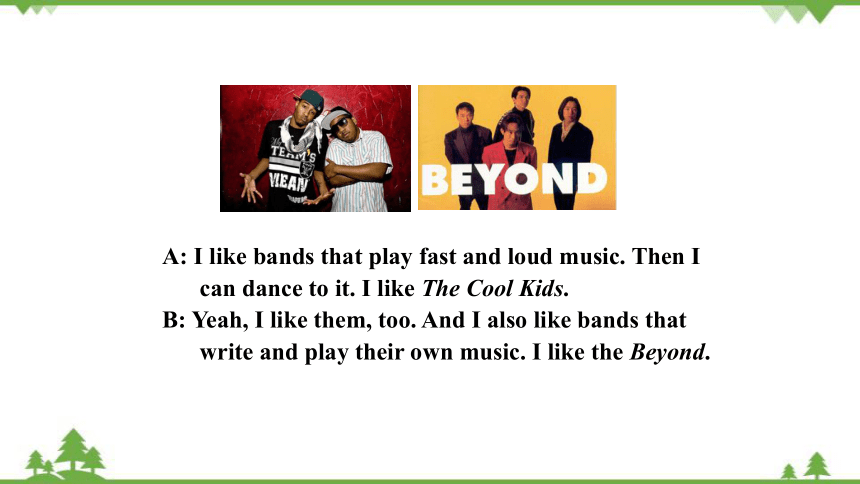
文档简介
(共46张PPT)
Unit 4
I like music that I can dance to.
Section B 1a-2e
What kind of bands do you like
I love bands that…
…play different kinds of songs.
…play their own songs.
…make us happy.
What kind of books do you like
I prefer books that give me
something to think about.
I prefer books that…
Fill in the chart. Write names of your favorite book, movie and band.
Movie
Book
Band
Share your different answers.
Writing
1a
Listen and write the three things that Michael likes in the first column of the chart.
Listening
1b
What Michael likes Why he likes it
jacket He likes clothes that are unusual.
He likes writers ___.
He likes movies ___.
book
movie poster
Listen again. Write why Michael likes each thing in the second column of the chart in 1b.
What Michael likes Why he likes it
jacket He likes clothes that are unusual.
book He likes writers ____________
_____________.
movie poster He likes movies ____________.
who explains things well
that are scary
1c
Your favorite Why you like it
Movie: Titanic
Book
Band
A: I like movies that are sad. I love Titanic.
B: Oh, I don’t. I like movies that are scary. I really like …
Discuss your favorite things in 1a with your group. Say why you like each thing.
1d
Discuss your favorite things in 1a with your group.
A: I like movies that are… I love…
B: Oh, I don’t. I like movies that are …
A: I don’t mind … movies, but …
Your favorite Why you like it
Movie: Titanic
Book
Band
A: I like books that are interesting. I love Journey to the west.
B: No, I don’t. I like The Science Book for Girls and other intelligent beings. It helps us know how much fun science can be.
A: I like bands that play fast and loud music. Then I can dance to it. I like The Cool Kids.
B: Yeah, I like them, too. And I also like bands that write and play their own music. I like the Beyond.
How many Chinese musical instruments do you know about Do you know any famous pieces of music that are played on these instruments Make a list with your partner.
2a
The man is Abing. He was a folk musician. He wrote many pieces of beautiful music. He was born in Wuxi in 1893.
Which piece of his music is the most famous
Warming up
1) Which musician does the passage mainly talk about
2) What is the name of his most famous piece of music
Abing.
Erquan Yingyue.
Fast Reading
Read the passage and answer the questions.
2b
3) How does the writer feel about this piece of music
He feels that it is sad but beautiful, and it not only paints a picture of Abing’s own life but also makes people recall their deepest wounds from their own sad or painful experiences.
阅读指导
◆ 尝试使用阅读的策略帮助学生养成好习惯,培养自主学习,大胆尝试良好的阅读氛围。通读全文,先找出或总结出每段的主题大意。
◆ 阅读策略:在阅读中注意具体的细节。具体的细节可能是举出的例子,涉及的原因,表达的观点或每段文章中的其他详细信息。
Read the passage again and use suitable words to complete the main idea of each paragraph. Then list the supporting details in each paragraph.
Careful Reading
2c
Paragraph Main idea Supporting details
1 I was ____ by a piece of music named Erquan Yingyue. The music was strangely beautiful…
2 Abing lived a very _____ life.
3 Abing’s musical skills made him very ______.
Paragraph 1: 指导
读本段文章可知:作者听到二泉映月时被深深感动。支持这个观点的具体细节:
◆ The music was strangely beautiful but under the
beauty I sensed a strong sadness and pain.
◆ It was one of the most moving pieces of music that
I’ve ever heard.
◆ I almost cried along with it as I listened.
Paragraph 2: 指导
读本段文章可知:阿炳早期过着贫穷的生活。支持这个观点的具体细节:
◆ His mother died when he was very young.
◆ His father died when he was a teenager.
◆ He was poor and homeless.
◆ He developed an illness and became blind.
◆ He lived on the streets and played music to make money.
Paragraph 3: 指导
读本段文章可知:阿炳的音乐才能使他成为很受欢迎的人。支持这个观点的具体细节:
◆ He could play over 600 pieces, and he wrote many
of them himself.
◆ His most famous piece is still played and praised
by erhu master today.
◆ Erquan Yingyue has become one of China’s
national treasures.
Paragraph Main idea
1 I was _______ by a piece of music named Erquan Yingyue.
2 Abing lived a very ______ life.
3 Abing’s musical skills made him very __________.
moved
hard
popular
Paragraph Supporting details
1
◆ The music was strangely beautiful but under the beauty I sensed a strong sadness and pain.
◆ It was one of the most moving pieces of music that I’ve ever heard.
◆ I almost cried along with it as I listened.
Paragraph Supporting details
2
◆ His mother died when he was very young.
◆ His father died when he was a teenager.
◆ He was poor and homeless.
◆ He developed an illness and became blind.
◆ He lived on the streets and played music to make money.
Paragraph Supporting details
3
◆ He could play over 600 pieces, and he wrote many of them himself.
◆ His most famous piece is still played and praised by erhu master today.
◆ Erquan Yingyue has become one of China’s national treasures.
Circle that or who and fill in the blanks with the words in the box.
pain
wounds
sense
pity
praise
指导:
1) 在定语从句中,如果先行词是物,关系代词我们可用that, 如果先行词是人, 关系代词可选用who/that。
2) Try to guess the meaning of these words in the box.
Post Reading
2d
Abing played music (that/who) could touch the hearts of people. When we listen to his music, we can ______ both the beauty and the sadness in it. It makes us think about the _____ and _______(that/who) we have experienced in the past. For this reason, many people _____ him as the musician (that/who) has greatly influenced erhu music. So it is really a ______ that not many pieces of his music were recorded.
sense
pain
wounds
praise
pity
Student A is foreign visitor who is interested in Abing and his music. Student B is a Chinese student who knows about Abing. Use the information in the passage to make a conversation.
2e
What kind of musical instruments did Abing play
He could play many instruments, but he is best known for playing the erhu.
1. …I sensed a strong sadness and pain.
1) sense v. 感觉到, 意识到
e.g. We all seemed to sense his sadness at that time.
在那个时候我们好像都感觉到了他的悲伤。
Language points
sense n. 意识,感觉
e.g. People have five senses, sight, hearing, smell,
taste, and touch.
人有五种感觉:视觉,听觉,嗅觉,味觉和触觉。
2) sadness n. 悲哀
e.g. Don't give yourself up to sadness, there's still
hope!
不要太悲伤,还有希望!
ness是个名词后缀,一些形容词后加ness可变成名词,如:
happy—happiness kind--kindness
sad adj. 悲伤的,忧愁的
e.g. She sang a sad song. 她唱着悲伤的歌。
3) pain n. 疼痛,努力
e.g. He has pains in the arm. 他手臂痛。
painful adj. 痛苦的;疼痛的;令人不快的
e.g. He had a painful experience in the past.
他过去有一段痛苦的经历。
2. The piece had a simple name, Erquan Yingyue (Moon Reflected on Second Spring),…
piece表示音乐作品,相当于汉语的“一首歌;一支乐曲”等。
e.g. When he was a small boy, he could hum songs and difficult pieces of music.
当他还是个小孩子,就会哼唱歌曲和颇有难度的乐曲。
I especially like that short piece by Beethoven.
我特别喜欢贝多芬的那首小曲。
reflect v. 反映,映出
e.g. His actions reflect his thoughts.
他的行为反映他的思想。
3. Later I looked up the history of Erquan Yingyue…
look up (在字典,参考书中,通过电脑)查阅,
抬头看
e.g. It is unnecessary to look up every word you
don’t know in the dictionary while your are
reading.
阅读时,碰到生词,不必都要在词典中查阅。
I looked up and saw him. 我抬起头来看见了他。
4. He performed in this way for many years.
perform v. 表演,执行
e.g. He performed a dance for them. 他为他们表演了一个舞蹈。
He performed his duties perfectly. 他圆满地完成了自己的任务。
5. It is a pity that only six pieces of music in total were recorded for the future world to hear, but his popularity continues to this day.
1) pity n. 遗憾,怜悯
e.g. It’s pity that you missed the beginning of the
movie.
很遗憾你错过了电影的开头。
2) total n. 总数,合计
e.g. Their expenses reached a total of 1,000 pounds. 他们的花费总计一千英镑。 Add this numbers together and give me the
total.
把这些数字加起来,告诉我总数是多少。
in total 总共;合计
e.g. In total over 100 people attended the conference.共计有百余人参加了这个会议。
total adj. 总的,全体的
e.g. What is the total population of Japan
日本的总人口为多少
popularity 表示“声望;知名度”之意。当我们说to win popularity或to enjoy popularity即指“享盛名;得众望;受欢迎”。
e.g. Country music is growing in popularity.
乡村音乐正逐渐得到更多人的喜爱。
6. …all the great erhu masters play and praise.
praise n. 赞扬,表扬
e.g. He won praises for his modesty. 他以自己的谦虚赢得别人的赞扬。
He deserves all the praise. 他值得我们一切的赞美。
praise v. 赞扬,表扬
e.g. The teacher praised her many times because
of her kindness.
因为她的善良,老师表扬了她很多次。
7. …makes people recall their deepest wounds from their own sad or painful experiences.
wound n. 伤口,创伤
e.g. He has a wound in the arm. 他臂上有一处伤。
wound v. 使(身体)受伤;伤害
e.g. Two soldiers were wounded in the attack. 在这次袭击中,有两名士兵受伤。
You must not wound her feelings. 你不可以伤害她的感情。
1. 课后阅读短文,试着复述这个故事。
2. Write a passage about Abing and Erquan Yingyue.
Homework
Unit 4
I like music that I can dance to.
Section B 1a-2e
What kind of bands do you like
I love bands that…
…play different kinds of songs.
…play their own songs.
…make us happy.
What kind of books do you like
I prefer books that give me
something to think about.
I prefer books that…
Fill in the chart. Write names of your favorite book, movie and band.
Movie
Book
Band
Share your different answers.
Writing
1a
Listen and write the three things that Michael likes in the first column of the chart.
Listening
1b
What Michael likes Why he likes it
jacket He likes clothes that are unusual.
He likes writers ___.
He likes movies ___.
book
movie poster
Listen again. Write why Michael likes each thing in the second column of the chart in 1b.
What Michael likes Why he likes it
jacket He likes clothes that are unusual.
book He likes writers ____________
_____________.
movie poster He likes movies ____________.
who explains things well
that are scary
1c
Your favorite Why you like it
Movie: Titanic
Book
Band
A: I like movies that are sad. I love Titanic.
B: Oh, I don’t. I like movies that are scary. I really like …
Discuss your favorite things in 1a with your group. Say why you like each thing.
1d
Discuss your favorite things in 1a with your group.
A: I like movies that are… I love…
B: Oh, I don’t. I like movies that are …
A: I don’t mind … movies, but …
Your favorite Why you like it
Movie: Titanic
Book
Band
A: I like books that are interesting. I love Journey to the west.
B: No, I don’t. I like The Science Book for Girls and other intelligent beings. It helps us know how much fun science can be.
A: I like bands that play fast and loud music. Then I can dance to it. I like The Cool Kids.
B: Yeah, I like them, too. And I also like bands that write and play their own music. I like the Beyond.
How many Chinese musical instruments do you know about Do you know any famous pieces of music that are played on these instruments Make a list with your partner.
2a
The man is Abing. He was a folk musician. He wrote many pieces of beautiful music. He was born in Wuxi in 1893.
Which piece of his music is the most famous
Warming up
1) Which musician does the passage mainly talk about
2) What is the name of his most famous piece of music
Abing.
Erquan Yingyue.
Fast Reading
Read the passage and answer the questions.
2b
3) How does the writer feel about this piece of music
He feels that it is sad but beautiful, and it not only paints a picture of Abing’s own life but also makes people recall their deepest wounds from their own sad or painful experiences.
阅读指导
◆ 尝试使用阅读的策略帮助学生养成好习惯,培养自主学习,大胆尝试良好的阅读氛围。通读全文,先找出或总结出每段的主题大意。
◆ 阅读策略:在阅读中注意具体的细节。具体的细节可能是举出的例子,涉及的原因,表达的观点或每段文章中的其他详细信息。
Read the passage again and use suitable words to complete the main idea of each paragraph. Then list the supporting details in each paragraph.
Careful Reading
2c
Paragraph Main idea Supporting details
1 I was ____ by a piece of music named Erquan Yingyue. The music was strangely beautiful…
2 Abing lived a very _____ life.
3 Abing’s musical skills made him very ______.
Paragraph 1: 指导
读本段文章可知:作者听到二泉映月时被深深感动。支持这个观点的具体细节:
◆ The music was strangely beautiful but under the
beauty I sensed a strong sadness and pain.
◆ It was one of the most moving pieces of music that
I’ve ever heard.
◆ I almost cried along with it as I listened.
Paragraph 2: 指导
读本段文章可知:阿炳早期过着贫穷的生活。支持这个观点的具体细节:
◆ His mother died when he was very young.
◆ His father died when he was a teenager.
◆ He was poor and homeless.
◆ He developed an illness and became blind.
◆ He lived on the streets and played music to make money.
Paragraph 3: 指导
读本段文章可知:阿炳的音乐才能使他成为很受欢迎的人。支持这个观点的具体细节:
◆ He could play over 600 pieces, and he wrote many
of them himself.
◆ His most famous piece is still played and praised
by erhu master today.
◆ Erquan Yingyue has become one of China’s
national treasures.
Paragraph Main idea
1 I was _______ by a piece of music named Erquan Yingyue.
2 Abing lived a very ______ life.
3 Abing’s musical skills made him very __________.
moved
hard
popular
Paragraph Supporting details
1
◆ The music was strangely beautiful but under the beauty I sensed a strong sadness and pain.
◆ It was one of the most moving pieces of music that I’ve ever heard.
◆ I almost cried along with it as I listened.
Paragraph Supporting details
2
◆ His mother died when he was very young.
◆ His father died when he was a teenager.
◆ He was poor and homeless.
◆ He developed an illness and became blind.
◆ He lived on the streets and played music to make money.
Paragraph Supporting details
3
◆ He could play over 600 pieces, and he wrote many of them himself.
◆ His most famous piece is still played and praised by erhu master today.
◆ Erquan Yingyue has become one of China’s national treasures.
Circle that or who and fill in the blanks with the words in the box.
pain
wounds
sense
pity
praise
指导:
1) 在定语从句中,如果先行词是物,关系代词我们可用that, 如果先行词是人, 关系代词可选用who/that。
2) Try to guess the meaning of these words in the box.
Post Reading
2d
Abing played music (that/who) could touch the hearts of people. When we listen to his music, we can ______ both the beauty and the sadness in it. It makes us think about the _____ and _______(that/who) we have experienced in the past. For this reason, many people _____ him as the musician (that/who) has greatly influenced erhu music. So it is really a ______ that not many pieces of his music were recorded.
sense
pain
wounds
praise
pity
Student A is foreign visitor who is interested in Abing and his music. Student B is a Chinese student who knows about Abing. Use the information in the passage to make a conversation.
2e
What kind of musical instruments did Abing play
He could play many instruments, but he is best known for playing the erhu.
1. …I sensed a strong sadness and pain.
1) sense v. 感觉到, 意识到
e.g. We all seemed to sense his sadness at that time.
在那个时候我们好像都感觉到了他的悲伤。
Language points
sense n. 意识,感觉
e.g. People have five senses, sight, hearing, smell,
taste, and touch.
人有五种感觉:视觉,听觉,嗅觉,味觉和触觉。
2) sadness n. 悲哀
e.g. Don't give yourself up to sadness, there's still
hope!
不要太悲伤,还有希望!
ness是个名词后缀,一些形容词后加ness可变成名词,如:
happy—happiness kind--kindness
sad adj. 悲伤的,忧愁的
e.g. She sang a sad song. 她唱着悲伤的歌。
3) pain n. 疼痛,努力
e.g. He has pains in the arm. 他手臂痛。
painful adj. 痛苦的;疼痛的;令人不快的
e.g. He had a painful experience in the past.
他过去有一段痛苦的经历。
2. The piece had a simple name, Erquan Yingyue (Moon Reflected on Second Spring),…
piece表示音乐作品,相当于汉语的“一首歌;一支乐曲”等。
e.g. When he was a small boy, he could hum songs and difficult pieces of music.
当他还是个小孩子,就会哼唱歌曲和颇有难度的乐曲。
I especially like that short piece by Beethoven.
我特别喜欢贝多芬的那首小曲。
reflect v. 反映,映出
e.g. His actions reflect his thoughts.
他的行为反映他的思想。
3. Later I looked up the history of Erquan Yingyue…
look up (在字典,参考书中,通过电脑)查阅,
抬头看
e.g. It is unnecessary to look up every word you
don’t know in the dictionary while your are
reading.
阅读时,碰到生词,不必都要在词典中查阅。
I looked up and saw him. 我抬起头来看见了他。
4. He performed in this way for many years.
perform v. 表演,执行
e.g. He performed a dance for them. 他为他们表演了一个舞蹈。
He performed his duties perfectly. 他圆满地完成了自己的任务。
5. It is a pity that only six pieces of music in total were recorded for the future world to hear, but his popularity continues to this day.
1) pity n. 遗憾,怜悯
e.g. It’s pity that you missed the beginning of the
movie.
很遗憾你错过了电影的开头。
2) total n. 总数,合计
e.g. Their expenses reached a total of 1,000 pounds. 他们的花费总计一千英镑。 Add this numbers together and give me the
total.
把这些数字加起来,告诉我总数是多少。
in total 总共;合计
e.g. In total over 100 people attended the conference.共计有百余人参加了这个会议。
total adj. 总的,全体的
e.g. What is the total population of Japan
日本的总人口为多少
popularity 表示“声望;知名度”之意。当我们说to win popularity或to enjoy popularity即指“享盛名;得众望;受欢迎”。
e.g. Country music is growing in popularity.
乡村音乐正逐渐得到更多人的喜爱。
6. …all the great erhu masters play and praise.
praise n. 赞扬,表扬
e.g. He won praises for his modesty. 他以自己的谦虚赢得别人的赞扬。
He deserves all the praise. 他值得我们一切的赞美。
praise v. 赞扬,表扬
e.g. The teacher praised her many times because
of her kindness.
因为她的善良,老师表扬了她很多次。
7. …makes people recall their deepest wounds from their own sad or painful experiences.
wound n. 伤口,创伤
e.g. He has a wound in the arm. 他臂上有一处伤。
wound v. 使(身体)受伤;伤害
e.g. Two soldiers were wounded in the attack. 在这次袭击中,有两名士兵受伤。
You must not wound her feelings. 你不可以伤害她的感情。
1. 课后阅读短文,试着复述这个故事。
2. Write a passage about Abing and Erquan Yingyue.
Homework
同课章节目录
- Unit 1 When was it invented?
- Section A
- Section B
- Unit 2 Teenagers should be allowed to choose their
- Section A
- Section B
- Unit 3 It must belong to Carla.
- Section A
- Section B
- Unit 4 I like music that I can dance to.
- Section A
- Section B
- Unit 5 You’re supposed to shake hands.
- Section A
- Section B
- Unit 6 Sad movies make me cry.
- Section A
- Section B
- Unit 7 Life is full of the unexpected.
- Section A
- Section B
- Unit 8 We're trying to save the earth!
- Section A
- Section B
- Unit 9 It's important to have good habits.
- Section A
- Section B
- Unit 10 I remember meeting all of you in Grade 6.
- Section A
- Section B
